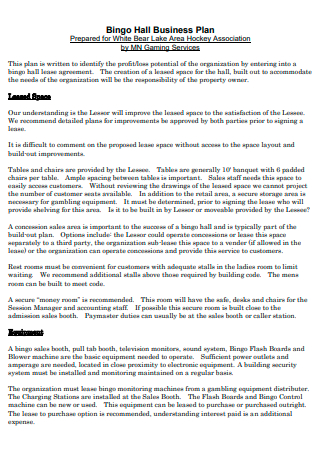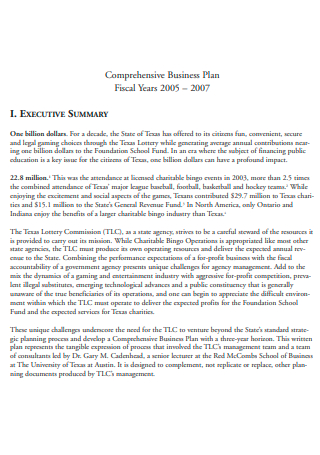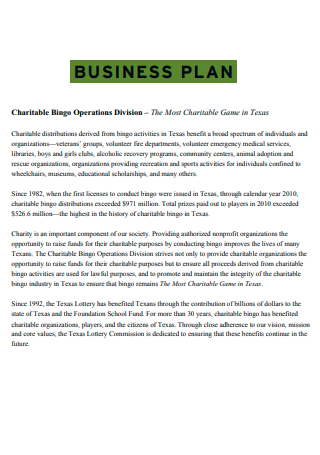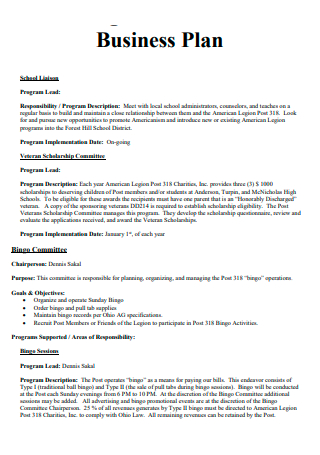3+ Sample Bingo Business Plan
FREE Bingo Business Plan s to Download
3+ Sample Bingo Business Plan
What Is a Bingo Business Plan?
What Is a Bingo?
There Are 5 Ways Bingo Can Help Boost the Senior Health:
How Does Bingo Parlor Make Money?
How Do You Play Bingo?
How to Open a Bingo Parlor:
FAQs
Is bingo a gamble?
Do you need a license to play bingo?
What is the secret to winning bingo?
Is owning a bingo hall profitable?
What Is a Bingo Business Plan?
Bingo business plan is a written document describing a bingo parlor’s main business activities, objectives, and how it plans to achieve its goals. The first section of this business plan is the executive summary which serves as the introduction of the business plan. It is an overview of all the sections of the plan. This only includes the most important details of every section since the executive summary must not exceed more than one page. In addition, written is the company background as well where you give an extensive background of the business and the reason with well-written details to establish a bingo parlor. Incorporate details such as the facilities, tools, materials, and equipment you will use in your operations.
Take in the details of the services you offer to your customers. You can transition by explaining the daily operations of your bingo parlor. Your industry analysis is your research about the betting industry; particularly playing games such as bingo. Include some background details, the current trend and studies regarding the industry, and the future of the industry.
Thus, your customer analysis is where you describe the type of customers who are anticipated to play bingo games. Put in information such as their gender, age, household income, the amount they will spend in bingo parlors per visit, their hobbies, and the location where they reside.
Within this plan, the competitive analysis is where you include the research on your local competition. Your analysis must comprise key findings of your competitions such as the number of organizations with similar businesses, and their backgrounds. Include an enthralling explanation of how you can compete with them by offering a better quality of service and less expensive costs of products compared to your rivals.
Lastly, the most important part of the bingo business plan is the financial plan where you cover all the details of your finances and the ways you plan to control and manage your finances. This financial plan must have the following details as your income statement: profit and loss statements, balance sheet, cash flow analysis, breakeven analysis, and general operations expenses. Having this plan can help you track your finances and make sure you do not waste your revenue on unnecessary things. You must have a transparent record of the flow of your finances since authorities have certain laws regarding organizations that have betting activities.
What Is a Bingo?
Bingo is a game of chance in which every player matches numbers printed in different arrangements on cards with the numbers the game host or caller draws at random, marking the selected numbers with tiles. When a player finds the selected numbers are arranged on their card in a row, they call out “Bingo!” to alert all participants to a winning card, which prompts the game host or an associate assisting the host to evaluate the card for authentication of the win. Players compete against each other to be the first to have a winning arrangement for the prize or jackpot. After a winner is recognized, the players clear their number cards of the tiles and the game host begins a new round of play.
Different methods of play try to raise the participation by creating excitement. Hence, modern bingo has evolved into a lot of variations, with each jurisdiction’s gambling laws regulating how the game is played. There are also nearly unlimited patterns that may be particular for play. Some games need only one number to be matched, while cover-all games award the jackpot for covering an entire card. There are even games that award prizes to players for matching no numbers or achieving no pattern.
Nonetheless, bingo is when someone calls out numbers and if you are the first person to have all the numbers called out, you win the game. You can say ‘bingo!’ as a result of winning or when something pleasant happens, especially in a surprising, unexpected, or sudden way.
There Are 5 Ways Bingo Can Help Boost the Senior Health:
Bingo has become a go-to game and mainstay activity for residential care facilities, community and senior centers, and church groups. Researchers have discovered that this game has a lot more value than for just fun and leisure. Bingo has a few health benefits that may not be well-known, but are surely worth taking into consideration. Here are the 5 ways bingo can help improve senior health:
How Does Bingo Parlor Make Money?
Operational expenses provide opportunities for the bingo parlor to make money, mainly because expenses normally pass through the bingo parlor to the sponsoring charity. Although gaming laws in some states regulate expenses, such as the rent a facility owner can charge, most other operating expenses are unregulated. Payouts for every single event during tournaments can reach a total of $100,000+. These are paid out as $1,000+ prizes for single games and more than $10,000 for significant achievements such as coveralls. Progressive jackpots have the highest possible cash prizes than other bingo games.
How Do You Play Bingo?
Playing bingo is really simple and even people who previously never played it before can master the rules of the game right away.
First, players buy bingo cards with random numbers printed on them in a 5 x 5 grid that correlates to the five letters of the word B-I-N-G-O. Players must make sure to bring cash as parlors do not generally accept cards as payment. Players must watch and listen to the caller for every number-letter combination. If the number-letter combination is present in their card, they need to mark them. They must create a vertical, horizontal, or diagonal line on one of their cards to yell ‘Bingo!” and win the prize.
In addition, the caller deals 5 cards to each player, face up, from the first deck. Then, they take cards from the second deck one at a time and call out the rank and suit. If they call out a card you have in your deck, turn it face down. The first player to turn all their cards face down gets a bingo.
How to Open a Bingo Parlor:
Look for information on rules and regulations managing the operation of bingo parlors through individual state gaming control boards and attorney general offices.
Step 1: Get a License
Secure all important licenses and permits needed to operate a bingo parlor in your area. As a form of gaming, bingo parlors are regulated by the individual states in which they are operated. A criminal background check is also normally required for individuals seeking the right to operate a bingo parlor.
Step 2: Make a Proper Plan
Develop a comprehensive bingo business plan that outlines fundamental information related to how you will operate the bingo parlor. The business plan should contain details about the financing required to start up and operate the business. Take into consideration costs related to renting or purchasing a building, insurance, utilities, equipment, staffing, marketing and advertising.
Step 3: Get Your Sources or Fund
If in need, apply for a business start-up funding. For great results, look for financial institutions that specialize in business lending. Contact your local Small Business Administration office or state Small Business Development Center for guidance on alternative business funding options if traditional funding is unavailable.
Step 4: Look for the Best Location
Conduct an ocular at the potential sites for running the bingo parlor and choose a location. Take into consideration the size and space that you need to accommodate the anticipated number of customers you plan to attract. A commercial real estate professional can assist in this area. Also consider parking needs, concession sales (if applicable), restroom facilities, and the space needed for traditional bingo parlor equipment. This generally includes a bingo blower, a sound system for calling numbers and one or more large display screens for displaying numbers.
Step 5: Buy the Equipment Needed
Purchase all essential furniture and equipment like chairs, long tables, bingo cards, and markers or electronic bingo cards and other necessary supplies. If you offer snacks, make sure you get the applicable permits from the local health department and design and set up the concession area.
Step 6: Find an Amazing Team
Screen, hire, and train employees. For great results, choose individuals who speak clearly and have superior customer service skills. Make sure they are capable of a good communication and they have good personalities.
Step 7: Schedule and Services
Establish business hours, the specific types of bingo games that you will offer, the cost for playing, and prize payout amounts.
Step 8: Market Your Business
Advertise the bingo business through electronic and print media. Host a grand opening event to attract customers. You may also create leaflets, posters, banners, or social media accounts to reach certain audience.
FAQs
Is bingo a gamble?
It is something the state and federal law counts as gambling when bingo has players engaging in a cash or monetary exchange. Although, since 2011, this form of gaming is no longer illegal by federal law. But, if playing bingo online, there are ten states that consider the game illegal.
Do you need a license to play bingo?
You need a license to run any kind of online or ‘remote’ bingo. This comprises any type of game where players would be taking part virtually.
What is the secret to winning bingo?
Skilled bingo players will know which games will go for longer and which games are usually decided in fewer calls. For instance, if there are 99 bingo balls in play, and it is a short game, choose cards with numbers closer to 1 and 99. If it is a long game, choose numbers that are closer to the median number, 45.
Is owning a bingo hall profitable?
Running seven days per week, the annual net profit for the business could potentially be $200,000 per year after all expenses based on other bingo halls in the north suburban area. The net receipts are gotten from approximately 75% bingo and 25% pull tab sales.
Opening a bingo parlor is the same thing as opening any other business, though you may need special licenses and permits prior to launching your operation. In most states, bingo parlors can be run as for-profit businesses, while in other states, bingo parlors can be operated only by non-profit organizations or for the sole benefit of a charitable organization.
If an organization is planning to run a bingo parlor to raise funds for their charitable purposes, bingo parlors bring in a lot of money due to players wanting to play the game for the chances of winning large amount of money. Bingo will never go out of style so it is a profitable business as long as its operations are run legally, since many people love to play in games where they can win serious cash. If you want to start your own bingo parlor, make sure you have read everything in this article.




